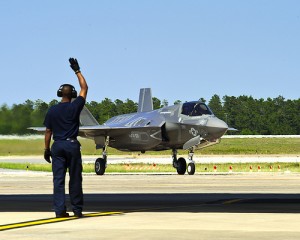
A Star-Telegram story from yesterday quoted a defense consultant and Lockheed spokespersons as shrugging off concerns that striking machinists will have any impact on the production of F-35 jets, the most expensive — and possibly most complicated — plane ever built.
The story comes a few days after a Star-T columnist happily declared that unions have gone the way of the dinosaur, and uses her experience at newspapers and Barnum and Bailey’s Circus to illustrate that point.
Sure, unions are responsible for the creation of a few workplace safety laws, like ones that prevent the exploitation of children, columnist J.R. Labbe says, but who needs them? Obviously not Lockheed, since its spokespersons have assured everyone that the less experienced, substitute workers are doing just as good a job as the striking machinists who have spent years working on a jet so complicated that its costs have become exorbitant even by Department of Defense standards.
Doesn’t that suggest union rules are “counterproductive in today’s modern manufacturing plant?” Labbe asks. It’s possible. But before we accept as gospel the assurances from one of the most controversial corporations in American history, it’s worth taking into account that the DoD inspectors asked for delays in flight safety tests just a few months ago.
Striking union members warned about just those kinds of problems in Wednesday’s Star-T story.
They say that those tests are being overseen by workers not specifically trained to handle them. Maybe that’s not a problem, but it still seems a little early to start talking about the hidden “thorns” in the union rosebushes.












